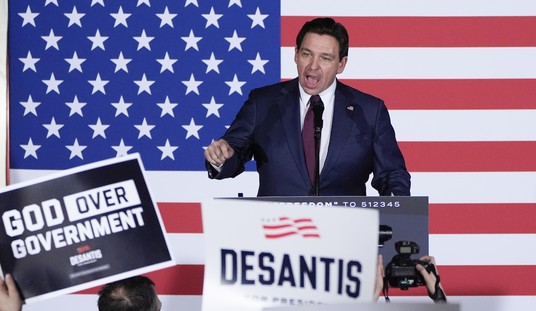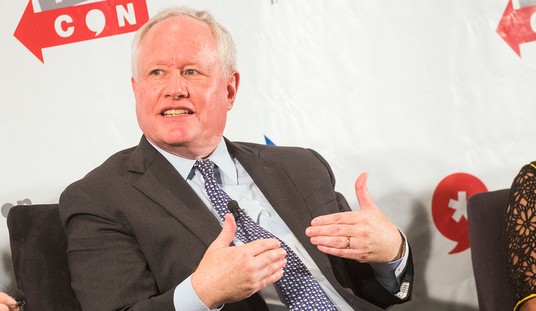HENDERSON: You know, so far, so good, right? I mean, I think in that question he was talking about negotiating with Iran and negotiating with other countries, and he said of those other countries that they would do what he told them to do. And that is what he’s running as: The alpha male. His personality is his argument as well. And, in some ways, this has shades of Obama in some ways, right? Obama’s argument was in some ways that, because of his personality, that he could change the ways of Washington. This was a different Trump. It was a subtle Trump.
RUSH: Well, look, I didn’t mean to build you up here for that, but the point is, it’s not, “Trump is an idiot.” Now what they’re doing, is they’re trying to compare Trump to Obama — who they love — and they’re trying to say that Trump is now effecting the same personality type and strategies that Obama did, that Obama believed. Just by the force of his personality and his ability to give a speech, that he could bring enemies to their knees.
What he’s done is the exact opposite of bring our enemies to their knees. There is no comparison the way Trump is talking about our enemies and the way Obama talks about ’em. Trump is not just referring to the force of his personality. But that he need they want to believe, it’s what they want to believe.
Pawlenty recently compared the rise of Donald Trump to a tornado, but said in the C-SPAN interview that it’s time to consider the possibility that the celebrity real estate mogul may win some states in the primary race.
“If you would have asked me that a month ago, I would have said no,” Pawlenty said. “But seeing the surprising resilience of his appeal and the rawness that he speaks—he seems to be able to say almost anything and it doesn’t substantially affect his polling numbers—he may have more staying power than most people first realized.”
Acknowledging that “it’s only August,” Pawlenty said whether it’s Trump or someone else, that 2016 may be the year when the Republican Party decides to nominate an anti-establishment presidential nominee.
“It may be that there’s a fundamental message and shift in the political culture of this country,” Pawlenty said, “where they’re saying, ‘I know it’s a little off. I know it’s offensive, but I’m so sick of these other politicians, and the way they talk and look and yappity yappity yap—they all sound alike and don’t say anything—and even with all of his warts, we kind of like Trump’s rawness.”
Asked for his evidence that the Mexican government is actively sending its undesirables here, he meandered a bit before essentially saying that he heard it from some dude. Asked about his alternative to Obamacare, he responded with the vaguest generalities about allowing the purchase of health insurance over state lines and creating an alternative system for people who can’t afford it. Asked what he would do about Iranian Gen. Qassem Soleimani reportedly traveling to Moscow in violation of the United Nations Security Council resolutions, Trump said, “I would be so different from what you have right now. Like, the polar opposite.”
My colleague Jonah Goldberg famously described Mitt Romney as speaking conservatism as if it’s a second language. Trump speaks it as if he needs help from a translator. He told Hannity the other night of the glories of health savings accounts, a market-oriented reform, even though he had praised socialized systems in Canada and Scotland (why not all of Great Britain?) in the debate. He also asserted to Hannity that his long-ago proposal for a wealth tax to retire the debt was “a very conservative thing.” He might want to talk to Art Laffer about that.
One lesson of the success of the Trump for president campaign is that as long as you are not making sense with great certainty and forcefulness, no one will care too much that you aren’t making sense. For now, it’s part of the genius of Trump as communicator.
To understand why Trump has made it so hard for a candidate like Perry to stand out, and why the billionaire reality star has had such a pernicious overall effect on the race, it’s worth going back to July, when Perry delivered a lengthy speech on financial reform at a two-hour event held at the Yale Club in Manhattan. It was in many ways an unusual topic for a Republican candidate to address at length; GOP candidates are more likely to call for the repeal of Dodd-Frank than to offer ideas of their own.
Perry’s speech, though, was peppered with wonky policy proposals—dealing with everything from strengthening capital requirements for big banks to overhauling the Consumer Financial Protection to building in “regulatory breathing room” for Bitcoin and other digital currencies. Perry didn’t have every detail nailed down, but relatively speaking it was a substantive and detailed speech that left a lot to discuss—and, perhaps, to disagree with. The former Texas governor promised flatly that as president he would never bail out any Wall Street bank. He also called for, among other things, regulations on certain types of mortgage products, crediting his state’s rules restricting cash-out refinancing for helping the state to weather the recession.
At the end of the two-hour event, there was time for one question from the audience. It went to a reporter from The Daily Mail who asked Perry not about anything from his speech but about attacks from the GOP presidential frontrunner, Donald Trump. Rick Perry jokingly responded that he’d like to challenge Trump to a pull-up contest. Google News currently counts more than 400 stories that reference Perry’s pull-up challenge. (Yes, for the record, I briefly referenced it too.)
That’s the Trump effect at work. The entire GOP field becomes defined by their relationship to Trump—by what Trump has said about them, and what they have said about him.
The fact is this: Trump’s supporters like Trump. End of story. They like his persona because it seems unrefined, brusque, brutal. They like that he’s no bulls***, even though he’s bulls*** from elbows to eyeballs…
Trump represents turnabout as fair play. Trump’s supporters are the same people who reacted, rightly, with outrage at the way in which the establishment treated Sarah Palin. Today, they look at Trump’s opponents whining about Trump bashing his opposition, and they feel that the shoe is now on the other foot—let the establishment take some on the chin, for a change…
Trump supporters see their political opposition as convenient conservatives, laying down loyalty oaths while happily dumping on their political allies at upper crust cocktail parties. Want those people to go third party with Trump? All Trump’s opponents have to do is keep reinforcing their own image as bullies to Trump but pantywaists unwilling to heap character attacks on Hillary Clinton or Barack Obama.
That Trump supporters’ perception of Trump opponents is at least partially inaccurate isn’t the point. That is their perception. And it won’t be changed by dumping on Trump’s character. The only way to stop The Donald is a slow, steady leeching away of his support by actual conservative candidates. But Trump’s supporters don’t know enough about his politics yet, because Trump’s detractors have been too busy screaming bloody murder over Trump’s bloody Megyn Kelly comments. If Trump’s opponents want to drive Trump out, they’ll have to attack Trump on the issues, because when it comes to character, Trump’s supporters will take the Teflon Don over his most ardent establishment detractors any day of the week.
Shapiro writes, “Trump is running a GFY campaign because he is incapable of running any other campaign. And his supporters are in a GFY mood.” (I presume you can figure out what GFY means. Think of an anatomically difficult position.)
We’ve all had those moods, but those moods aren’t particularly conducive to good decision-making. There was a time when relatively-cheerful conservatives scoffed at the Daily Kos crowd and their widespread descriptions of stopping speaking to family members over political disagreements. They seemed furiously angry, all the time, about everything. It made them insufferable and repellent. Today it’s impossible to contend that only one side of the ideological spectrum is gripped by anger. Peter Wood’s A Bee in the Mouth offered a good, detailed look at American’s changing attitude towards anger and public expressions of it; how something once seen as immature and hot-headed became seen as mainstream, even healthy.
Sure, we’ve got a lot of reasons to be angry. But the country is in a very Dark-Side-of-the-Force mood, convinced that anger is empowering, not blinding. At some point, a person enveloped in relentless, fiery anger and grievances stops making sense to anyone else. When a movement’s philosophy is so easily summarized by “GFY”, it’s hard to believe they’re being unfairly “bashed.”
I asked Erickson what it said about the Republican Party that Trump was doing so well. Did it prove the party’s base consisted of racists and haters? “The Republican Party created Donald Trump,” Erickson told me, “because they made a lot of promises to their base and never kept them.” Voters are drawn to Trump, he said, because “he’s burning down the Republican Party that never listened to them to begin with.”
This is true enough. But surely some of the blame also lies with figures like Erickson, who encouraged activists to demand ever-more extreme tactics from their leaders and branded anyone who didn’t agree a RINO, or Republican In Name Only. At this year’s Gathering, Erickson pushed the candidates to support shutting down the government if Democrats wouldn’t agree to pull funding from Planned Parenthood in the wake of the gory recent fetal-tissue-harvesting videos. Cruz was one of several who agreed; Huckabee went further by saying he would refuse to raise the debt ceiling, threatening default.
Trump, ironically, actually is a Republican in name only. But he’s also a professional entertainer, and he has proven better than any of the actual candidates at the performative outrageousness that the GOP base has been encouraged to demand. When and if he finally stalls out or quits, the deep Republican divisions that he has successfully exploited will remain, bedeveling whichever candidate ends up with the booby prize of the nomination.
Trump’s relationship to his own wealth conveys an honesty that his followers say they like. Though he built his empire out of his father’s empire, he has never suffered from the sense of decorum or noblesse oblige that sometimes accompany inherited money. His style isn’t even nouveau riche so much as it is last-week-lottery-winner. To Trump, being a billionaire means plating everything in gold and slapping his name everywhere in huge block letters. It means that he gets to say whatever pops into his head and never has to say he is sorry. His celebrity “brand” is an alpha-male fantasy of wealth and power, revolving around the pleasure he takes in firing and suing people who displease him. He is the only 69-year-old white guy in America who gets to live like a rap star.
Rather than creating envy, the public role Trump enacts validates the aspirations of his admirers. His popularity is an expression of reverse identity politics, which turns white males from defendants into plaintiffs in the contest of victims. He and his followers fixate on political correctness that disallows their grievances about the social transformation under way. His braggadocio and misogyny speak to male privilege lost. His male supporters regard his crude sexism not as juvenile behavior but as a transgressive political statement.
In all of this, Trump’s closest point of comparison is less to any previous American politician than to Silvio Berlusconi in Italy. Both boast about their wealth, their brilliance, and the beautiful women they attract. The key difference is that Trump does not take himself all that seriously as a demagogue, lacking the self-discipline and long-range calculation. He is essentially a narcissist taking his ego out for a joy ride. It won’t last forever, so enjoy the trip.
He is an affront to anyone devoted to the project William F. Buckley began six decades ago with the founding in 1955 of the National Review — making conservatism intellectually respectable and politically palatable. Buckley’s legacy is being betrayed by invertebrate conservatives now saying that although Trump “goes too far,” he has “tapped into something,” and therefore. . . .
Therefore what? This stance — if a semi-grovel can be dignified as a stance — is a recipe for deserved disaster. Remember, Henry Wallace and Strom Thurmond “tapped into” things…
Television, which has made Trump (he is one of three candidates, with Mike Huckabee and John Kasich, who have had television shows), will unmake him, turning his shtick into a transcontinental bore. But not before many voters will have noticed weird vibrations pulsing from the GOP.
He is, in other words, the de facto candidate of American nationalists. Some of these people identify with the label neo-reactionary. Some call themselves pro-Western. Ann Coulter, a big fan of Trump, says it is about culture, and that’s probably what powers the surge of support for Trump among writers at Breitbart. Plenty of the most pro-Trump, anti-“cuckservative” voices are forthright that the racial composition of America is foremost on their mind…
Beyond the fact that he fails many litmus tests, Trump is a crudity. I’ve always thought that the whole point of being a reactionary was that it allowed you to admire the kind of greatness and excellence that aristocracy produces, the kind that democratic cultures ignore and impugn. But no man is more democratic than Donald Trump, whose first thought when contemplating a princess is that he “had a shot” with her. Trump is a nationalist by default, not conviction or temperament.
And that is the other side of the coin. People are attracted to him because Trump is a free man. He is free to ignore conventions of running for politics. He is free to say he won’t give up the leverage of a third-party bid while running for the GOP nomination. He’s free to say, to a conservative audience, that single-payer health care works in Scotland and Canada. A man who doesn’t need permission and consistently resists any external demands on his behavior is a fantasy character. In another time, this romance of the free man settled on the vengeful, rich, violent Andrew Jackson. Today it is on Donald Trump.
Trump is a nasty catharsis through which some fed-up conservatives are venting their furor over the plight of the country and politically correct hypocrisy. The mystery among the political and media class is how quickly these disgruntled conservatives will be cleansed and get Trump out of their systems, and whether it will happen before he does other Republican candidates real damage.
Scorning or ridiculing Trump’s hypocrisies, narcissism, or outlandishness won’t silence him, much less win over his supporters. That will happen only when voters find a more savvy, more informed, more polite — but equally blunt and unafraid — version of Trump, perhaps a candidate like either Carly Fiorina, Ted Cruz, Marco Rubio, or Scott Walker, all of whom are more likely to channel unapologetic conservative anger rather than crudely amplify it.
Trump will fade when his brand of medicine becomes even worse than the disease. Apparently we are not quite there yet.
The more we portray the angriest and least flexible elements of both parties as in charge and indicative of the national mood, the more the broader, disaffected swath of American voters turns away from the process altogether, seeing nothing in it that makes them anything other than depressed.
More to the point, no matter what they might say, the candidates and their advisers watch cable TV and read the paper, too. And that’s probably a big reason why nine other Republicans stood onstage with Trump last week and mostly stared at the backs of their fingernails while he mocked the very idea of political service and reduced their entire party to a prop in “The Apprentice.”
A Jeb Bush or a Marco Rubio doesn’t stand up, I’m betting, because they’re afraid the mob will turn on them. They’re not going to encourage what they imagine to be the rioting masses, but neither are they inclined to stand on top of a car and plead for sanity…
I’ll bet good money that the next Republican nominee will be the one who ultimately makes voters feel less anxious, rather than angrier. When it comes to the sound and fury of modern politics, it’s best not to mistake one for the other.
So who actually decides? This is broken down in a fascinating 2008 book called The Party Decides: Presidential Nominations Before and After Reform, written by four political science professors, led by Marty Cohen of James Madison University and David Karol of the University of Maryland. The book debunks the notion that the presidential nomination process is some Hollywood romance, where a Richard Gere–style candidate magically seduces his party’s voters, who are the Julia Roberts of this scenario. In reality, it is the Party Elites who choose the presidential nominee, shaping the menu in a way that leads the rank-and-file to vote for their selection. You don’t think that Washington elites and the cream of the donor classes reached their lofty status only to leave it to the masses to make the most important decision a party can make—choosing their presidential nominee?
According to The Party Decides, the clearest way that elites influence and effectively control nominations is through endorsements which the authors argue are probably the most significant factor in determining who will win presidential primaries. The authors examined which candidates were endorsed by sitting governors in presidential nominating contests between 1976 and 2004, and found that in all but one race, the man who got the highest percentage of gubernatorial endorsements before the Iowa caucuses won the nomination…
Americans are told that their country is a democracy—in reality, though, what the United States has is, at best, a weak democracy, in which the establishment elite exercise an outsize amount of power, while the masses are made to think they have a large say. And in a game controlled by political elites who care deeply about electability, Trump has no chance.








Join the conversation as a VIP Member